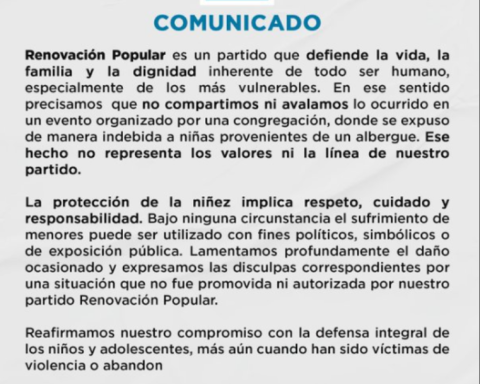In September of this year, the Congress of the Republic approved the new Teleworking Law, which establishes new provisions for employers and workers who are under this modality.
The regulations establish several aspects not contemplated in Law No. 30036, which is repealed, and makes certain changes in terms of working conditions. Next, find out all the details about this new provision and what people who telecommute, whether in the public or private sector, must take into account.
From when will the new Teleworking Law apply?
César Puntriano, labor lawyer and partner at Estudio Muñiz, indicates that the rule has been in force since September 12, 2022, but there is an adaptation period for public and private entities that at this date have workers under the remote work modality .
“The adaptation period is up to 60 calendar days counted from the day after the regulation is published. Now, the term of the Executive to publish said regulation is 90 days from September 12 “, precise.
That said, the Executive has until December 11 to issue the corresponding regulations. After that, there are a maximum of 60 more calendar days (until February 10) for companies to adapt.
In this framework, Puntriano highlights that remote work only applies until December 31, 2022; then, companies with employees under this modality will have to apply this law from January 1, even if the 60 calendar days of adequacy have not elapsed by that date.
What does the new Teleworking Law consist of?
As is known, this new rule repeals the old Teleworking Law No. 30036, published on June 5, 2013. Along these lines, the new law regulates teleworking as a modality that is initially voluntary, since both the employer and the worker have to agree to implement it.
However, the labor lawyer comments that the case may occur where it is the worker who takes the initiative to request the change of modality. In this figure, the employer has 10 ten working days to give an answer. If there is no response within that period, the request is considered approved.
On the other hand, it may be that the employer, in his power of direction, establishes teleworking.
One aspect to take into account is that if a person decides to travel to another country and continue teleworking for the company, it is totally valid, however, the taxation changes.
“If you are leaving the country, you would no longer have to deduct Income Tax, but you would have to pay taxes in the country of destination. In this sense, it is important to evaluate which country you are going to and what the tax rules are”, underlines.
Other than that, employment benefits, such as vacations, bonuses, etc., remain the same. The rule specifies that the worker is free to choose where he or she is usually going to telecommute, but has to inform his or her boss.
What are the sanctions for non-compliance with the Telework Law?
César Puntriano states that workers are subject to a set schedule, so they are not required to perform work outside of that schedule, or on vacations or rest days.
Along these lines, it is considered a very serious labor infraction not to respect the right to disconnect. In these cases, the only way to inspect this right is by filing complaints with Sunafil. The same workers have to denounce and demonstrate that they were working in time of digital disconnection.
“The sanctions in this case are based on the number of workers affected. For example, if there are 50 complainants, the fine would be 7.88 UIT or S/ 36,248″, indicates.
On the other hand, the employer is responsible for providing the equipment and internet access service. However, if it is agreed that the worker is going to contribute something, they must be financially compensated, unless they agree otherwise. The electricity service is also compensated.
It is worth mentioning that the amounts for the internet and electricity service are not yet known, since the norm indicates that the regulation is the one that must set this.
In addition, the tools provided by the company to the worker cannot be used by third parties or to carry out other activities, since, otherwise, the worker could be sanctioned. The regulations also state that the work is personal and the employee must report the work done to the employer during the day.
Who would be the most benefited?
The labor expert comments that the main beneficiaries of the new Teleworking Law would be people with disabilities.
“Workers will benefit here, especially those with some type of disability, which is the objective of this regulation. It seeks to generate inclusion, also with older adults and with people who are in risk groups.
In addition to this, it indicates that the regulations would benefit both parties. “Workers are more productive in this modality, it also protects them from certain risks, such as getting COVID, or avoiding accidents.”
On the other hand, the company avoids making certain operating expenses that often require face-to-face activity, in addition, the risks of occupational accidents and all that this implies economically disappear.
Eight aspects to take into account about the new Law
- Teleworking is a modality that can be applied totally or partially, temporarily or permanently.
- It is carried out from the place chosen by the worker, as long as it is necessary to carry out their work. It can even be a place outside the country.
- The employer and worker must agree if the worker will receive compensation for the cost of the internet service and electricity; as well as for the use of their electronic equipment, if applicable.
- The teleworker has the right to digital disconnection during the hours that are not part of his schedule. The digital disconnection time must be at least 12 hours per day in the case of unsupervised workers, such as managers.
- The worker can request to change modality. In this case, the employer has 10 working days to respond. If there is no response within that period, the request is considered approved.
- The tools provided by the company to the worker cannot be used by third parties or to carry out other activities, otherwise the worker could be sanctioned.
- If a person decides to telecommute from abroad, they must take into account that taxation changes. Therefore, it is important that I evaluate which country you are going to and what are the tax rules of the destination.
- The work performed under this modality is personal and the employee must report the work performed to the employer during the shift.

















